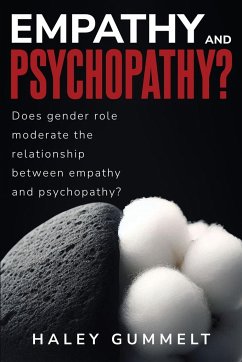Psychopathic individuals are distinct from non-psychopathic individuals in affective, interpersonal, and behavioral domains. A hallmark characteristic of psychopathic individuals is lack of empathy. Gender differences have been identified with regards to psychopathy and empathy. The current study examined two factors of empathy, Cognitive and Affective Empathy, and employed a triarchic model of psychopathy, which included boldness, meanness, and disinhibition as the three factors (Patrick, Fowles, & Krueger, 2009). The current study examined whether gender and/or gender roles moderated the relationship between the empathy and psychopathy factors. It was expected that gender roles, rather than gender alone, would moderate the relationship between empathy and psychopathy, such that masculine individuals would be deficient in empathy and endorse more psychopathic characteristics, whereas feminine individuals were expected to have more empathy and endorse fewer psychopathic characteristics. As expected, in the current study, females demonstrated higher levels of femininity, as well as empathy and cooperation, whereas males demonstrated higher levels of psychopathy (specifically boldness and meanness) and the propensity to look out only for their best interests and not cooperate with others. Further, masculine individuals demonstrated higher levels of boldness and meanness. Results from an Exploratory Factor Analysis, Canonical Correlation, and Hierarchical Regression indicated that affective empathy factors, rather than cognitive empathy factors, demonstrated the strongest negative relationship with boldness and meanness. Disinhibition demonstrated no relationship with either affective or cognitive empathy factors. Implications of these results are discussed.







